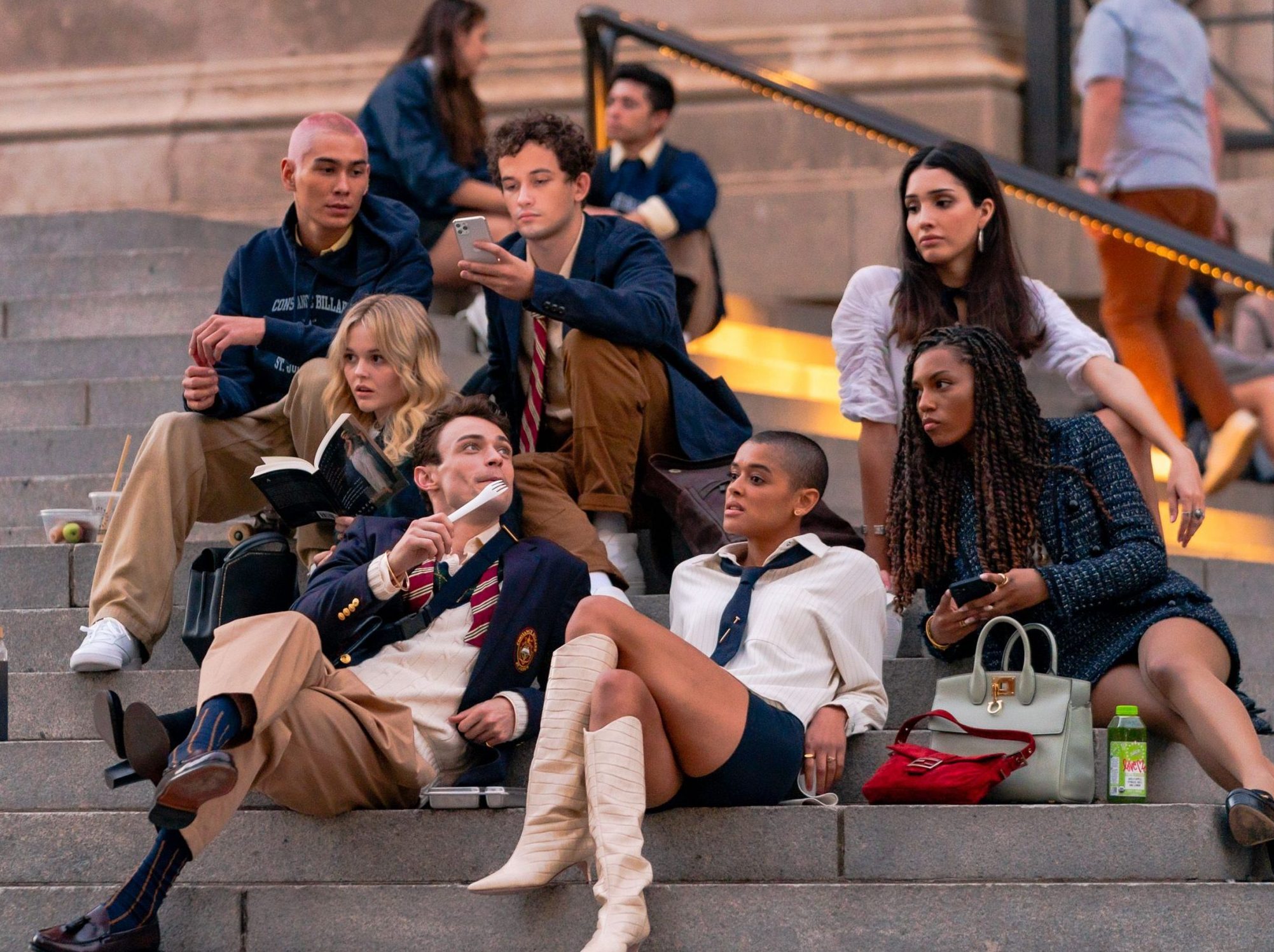Airing from 2007 to 2012, “Gossip Girl” was an iconic American TV show that followed the lives of several privileged teenagers in New York City. Criticized (and marketed) as “every parent’s nightmare,” the show was always a little bit controversial for its hedonistic portrayal of the Upper East Side, the brutal immorality of its teen characters, and its melodramatic, sometimes nonsensical plot points. Nonetheless, the show captured the attention of millions of viewers across the country despite (or maybe because) of its more problematic elements.
“Gossip Girl” was never truly interested in political commentary or deep thinking, choosing instead to revel in its own campiness. And for the most part, it worked.
The nastiness of its teen characters was actually new for the time, and their tendency to act more like adults than teenagers was also intriguing. With the subsequent popularity of shows like “Pretty Little Liars” and “Riverdale,” however, “Gossip Girl” hardly strikes modern audiences as scandalous. Many of its plot lines also haven’t aged well, as people look back on the characters’ toxicity with less affection than they did previously.
Among the many, many problems lies the show’s most obvious issue: its treatment of poverty.
How “Gossip Girl” Handles Its “Poor” Characters
As the show’s very premise centers around the lives of Manhattan’s elite, it stands to reason that the main characters are all largely self-centered and ambitious people, though some more than others. From the very first episode, the show establishes that “having it all” comes with additional pressures, and while later episodes do underscore how money can’t buy happiness, this message is often muddled by the casual and persistent classism of these (sometimes) sympathetic rich kids.
Jokes made at the expense of less privileged characters feel insensitive at best, and downright cruel at worst. The main characters never hesitated to poke fun at the less fortunate (and, naturally, their idea of poor is more in line with anyone else’s idea of middle class). Too many of Blair Waldorf’s iconic one-liners come at the expense of those impoverished folks who shop at L.L. Bean or have the audacity to not be born to great intergenerational wealth.
On top of that, entire storylines rely on the perceived poverty of other characters, such as when Dan and Serena’s relationship suffers from their different financial situations. In fact, the writers’ treatment of Dan, who other characters treat as an outsider despite being well-off when compared to the average person (unless the average person owns an art gallery), is the most obvious example of the story’s implicit message that there is some insurmountable divide between the classes.
Of course, the presence of classism alone does not make for bad television. This could have been an interesting critique of the ultra-wealthy, but “Gossip Girl” never delves any deeper into the classist narratives it perpetuates. And while the show never needed to be a scathing critique of wealth disparity, it does treat the same privileged characters with sympathy while simultaneously villainizing their less fortunate peers.
Characters like Blair Waldorf and Serena Van Der Woodsen end up highly successful without having to graduate college. Despite their pettiness and cruelty, they are both rewarded with safe and happy endings. Their terrible actions are more often than not forgiven — after all, trust fund kids can’t ever be held accountable.
The ambition and hypocrisy that characterize siblings Jenny and Dan Humphrey are swiftly derided, while the narrative gives far greater leeway to the similarly motivated and self-involved rich kids. Antagonistic characters of lesser means, like Julient Sharpe or Ivy Dickens, don’t receive the same redemption arcs that wealthier villains do. Even when they aren’t villainized, characters like Blair Waldorf’s maid Dorota are relevant only in the context of someone else’s story.
Interestingly enough, women trying to move above their station are treated far more harshly than their male counterparts. Jenny and Dan have the same economic background, and yet the writers villainize the former to a far greater extent before allowing her to fade into relative obscurity.
On the other hand, even though Dan is given his happy ending, it comes in the form of finally assimilating into the upper echelons of society, a choice that comes off as strange, considering the initial season’s themes of wanting to be above all the petty drama of the Upper East Side.
So, despite occasionally poking fun at the narcissism and first-world problems of its leads, the writers of “Gossip Girl” continued to portray anyone of lower social status as desperate or too ambitious for their own good. They stayed away from topics that were too real and justified the characters with the most privilege while also criticizing those with the least.
Admittedly, however, this served as part of the appeal of the show.
The Downfall of “Gossip Girl”
The show indulged in its audience’s greatest fantasies (with just a dose of self-awareness) while portraying a darker edge to the otherwise dazzling lives of Manhattan’s elite, slowly getting more ostentatious as time went on. There was a reason for this.
After the 2008 financial crisis, “Gossip Girl” took a sharp veer toward an over-the-top portrayal of wealth. People needed a form of escapism, and the writers were happy to deliver. So while the first season was somewhat more grounded, the second embraces a much more dramatic tone and sillier plotlines.
People responded to this in mixed ways. Some loved indulging in the “youthful voyeurism” as a form of wish fulfillment. Others didn’t find such aspirational dreaming appealing, especially when coupled with the increasingly bizarre storylines.
At a time when even more people were struggling, the show came off as tacky and in poor taste. This disconnect is partially reflected in the declining ratings for the show until its eventual cancellation in 2012, with some even speculating that the reason why “Gossip Girl” fell out of the cultural zeitgeist is because of the economic climate after 2008. And in the present day, after Occupy Wall Street and a growing awareness of social issues, the classism of “Gossip Girl” doesn’t endear itself to new audiences the way it once did.
What of the Reboot?
But that doesn’t mean the end of the show’s legacy. In this day and age, no form of media can stay down for too long without a reboot. A “Gossip Girl” reboot could work well for modern audiences, given our easy access to entire media accounts dedicated to celebrity drama and social commentary. “Gossip Girl” is also in desperate need of an update, as its approach to relationships, gender, technology and yes, class, made it a little too dated.
The creator of the show was quick to explain just how the crew was planning on modernizing the franchise, with showrunner Josh Safran stating, “These kids wrestle with their privilege in a way that I think the original didn’t,” and “more in wanting to be like the characters and less having what they have. Also, looking at it through Zoya’s eyes, you get a little bit of, ‘Careful what you wish for.’”
This announcement put off some fans, as it clearly meant the reboot would differ greatly from the original in some key aspects. After all, part of the fun of the original was that everyone was horrible. A delicate balancing act would be needed to make these new characters self-aware while also maintaining their less morally upright traits.
Furthermore, the original characters were terrible people in ways that the writers oftentimes ignored but still tied back to their own privilege, so it goes against the original show to argue that wealth and privilege aren’t inherently bad so long as they’re used for good.
It may be a different way to handle the classism problem in “Gossip Girl,” but it still uplifts the same privileged groups. The only difference is that it is now tied to the idea that rich people can still be nice, a mentality that can easily come off as performative, as the reboot’s characters deride a woman who can’t afford the Louis Vuitton bags they flaunt while also making passing comments about gentrification.
It’s strikingly hypocritical and feels like a tactic to make the characters more likable as opposed to actually criticizing the source of their influence. At least in the original, characters held few pretenses of moral righteousness.
It’s difficult to say whether or not the reboot’s hypocrisy is on purpose. Besides, this new “woke” version of “Gossip Girl” might handle the topic of privilege better in later episodes. If nothing else, the show is as melodramatic as it needs to be to attract both old and new fans. Plus, despite its flaws, there’s plenty of time for the reboot to turn itself around.
Given the media attention surrounding its pilot, I wouldn’t rule out the “Gossip Girl” reboot just yet. I can only hope it figures out where it wants to take its characters by the time this season wraps up.

















